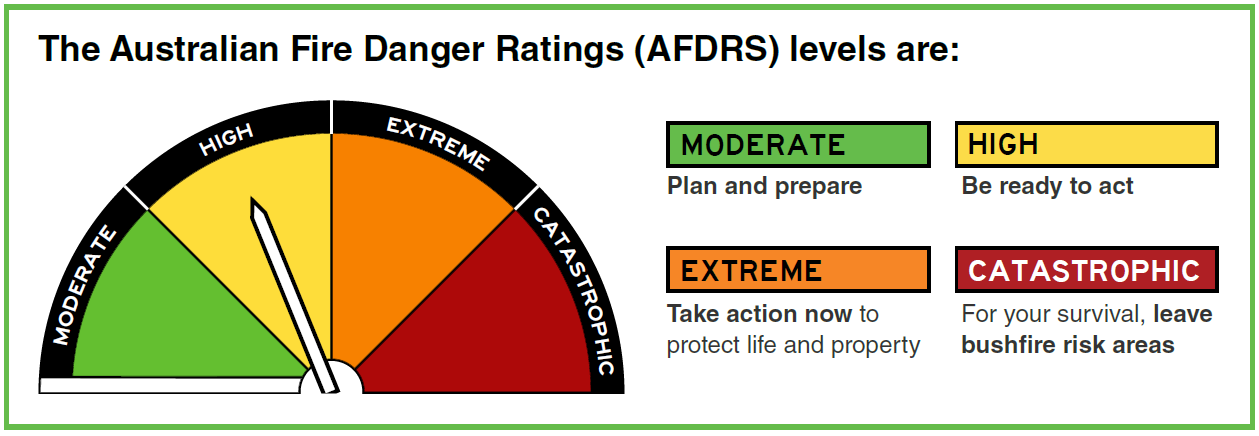Fire Safety Information
On this page, we give you information and other resources about the following:
Burning Times
| Prohibited |
Restricted |
Unrestricted |
| 1 December to 31 March* |
1 October to 30 November*
1 April - 31 May*
|
1 June - 30 September* |
- Strictly no burning or uncontrolled flame in the open-air
- Open-air is any open place, yard, paddock or construction area
- Patios, pergolas and huts that are open or partially open are open-air
- No lighting of camp fires, solid fuel barbecues or wood-fired pizza ovens
|
- All burning is under permit only
- Permits can be obtained from a Fire Control Officer
- Indoor fires are permitted^
- Solid fuel barbecues and wood fired pizza ovens may be
used under strict conditions
- No burning on Sundays and Public Holidays
- No lighting of camp fires
|
- Burning is permitted during this period
- Fires are to be contained within your property
|
*Dates may be adjusted depending on conditions
^Advice for Indoor Fires: Clean your flue or chimney at least once a year to prevent a build-up of flammable material and ensure your heater works efficiently. Regularly check the flue and chimney for cracks or damage as sparks and embers may enter the roof space and start a fire. Do not use combustible liquids to light open fires or combustion stoves (use fire-lighters instead). When disposing of ash, ensure it is completely cool and no embers remain
Australian Fire Danger Rating System (AFDRS)
Western Australia's Fire Danger Rating Forecast
Current Fire Danger Ratings for Today
The Shire of Chittering is in the 'Swan Inland North' Region for Fire Weather Forecasts.
Fire danger ratings describe the potential level of danger should a bushfire start.
They are important because they provide people with information so that they can take action to protect themselves and others from the potentially dangerous impacts of bushfires.

Total Fire Bans (TFB)
DFES Information on Total Fire Bans
Current Total Fire Bans for Today
Total Fire Bans are declared by the Department of Fire & Emergency Services (DFES) on days of extreme weather.
Many activities are prohibited during Total Fire Bans. To find out more, there are Fact Sheets that are regularly updated by DFES located on their website. Click the link above.
Riding Quad Bikes & Dirt Bikes
Riding a dirt or quad bike through a paddock (or similar area) during a ban is NOT PERMITTED.
Essentially the use or operation of any engine, vehicle, plant, equipment or machinery in the area likely to cause a bush fire or contribute to the spread of a bush fire is banned.
Generators
There is no law or policy governing the use of generators, however total fire bans and harvest / hot works / vehicle movement bans are intended to ensure that nothing is likely to cause a fire is undertaken.
Common sense needs to prevail therefore, and it is suggested that if you should need to use a generator ensure that it is run in a cleared area (or enclosed area - being mindful of fumes) with a minimum 3 metre mineral earth break around the generator as a suggestion.
Harvest, Hot Works and Vehicle Movement Bans (HHWVM)
Harvest, Hot Works & Vehicle Movement (HHWVM) bans are declared by the Shire of Chittering.
These bans are usually declared alongside a Total Fire Ban, however they can be declared as a standalone precaution.
| Activities Not Permitted |
Activities Permitted |
-
Harvesting operations
-
Any “hot works” (e.g. welding, grinding, cutting, heating etc) in the “open air” are not permitted, (note—these activities are not permitted during the term of any Total Fire Ban).
-
Use or operation of any engine, vehicle, plant, equipment or machinery in the area likely to cause a bush fire or contribute to the spread of a bush fire.
|
-
Movement of vehicles on “gazetted roads” (as described in Bush Fires Regulations 1954 r. 24A(1) and Road Traffic Act 1974 s. 5.1).
-
Movement of vehicles on a lane, driveway, yard or other area that provides access to, or a parking facility at, any residential, farming or business premises, if the area has been sufficiently cleared of flammable material to prevent the escape of fire.
-
Use or operation of a vehicle if it is for the prevention of an immediate and serious risk to the health or safety of a person or livestock, and only if all reasonable precautions have been taken to prevent the activity from creating a bush fire danger.
-
Use or operations of vehicles and undertaking of “hot works” by those persons holding a current Exemption under Bush Fires Act 1954 s. 22C (exemption from Total Fire Bans)
|
Emergency Alert Telephone Warning System
Emergency Alert - Be Warned. Be Informed
Emergency Alert is the national telephone warning system used by emergency services to send voice messages to landlines and text messages to mobile phones within a defined area about likely or actual emergencies.
Emergency Alert is just one way of warning communities and will not be used in all circumstances. Emergency Alert relies on telecommunications networks to send messages, and message delivery cannot be guaranteed.
There are a range of reasons why you may not receive a text message on your mobile phone including your text message inbox was full or your mobile phone was switched off or not in coverage. For more information click the link above.